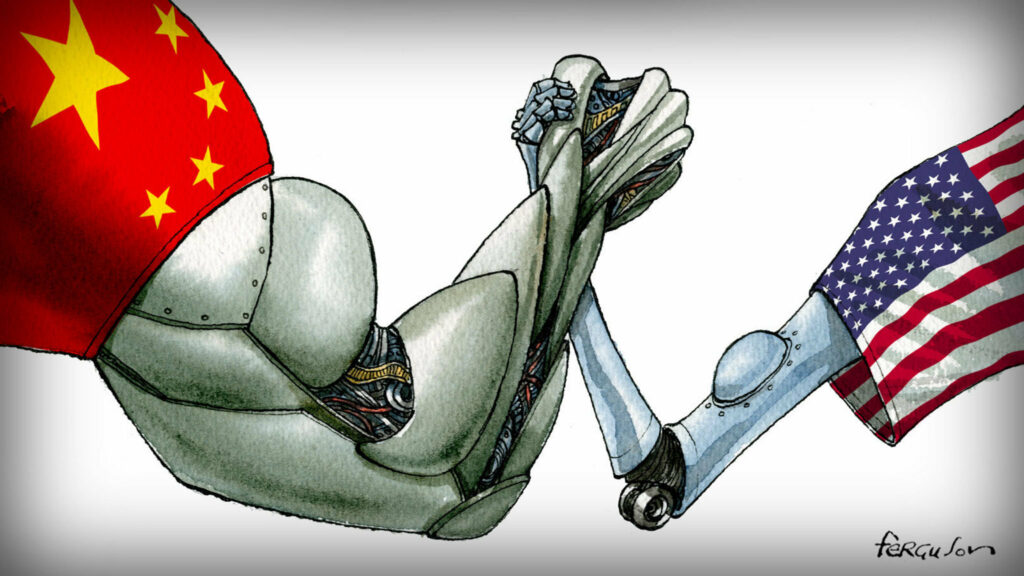Artificial intelligence (AI) has become a focal point of concern at the recent G7 summit, highlighting its potentially harmful impact. The United States and China are at the forefront of this technological race, with the US currently holding an advantage. However, analysts suggest that China has the potential to catch up in the coming years. This article delves into the strengths and weaknesses of both countries, exploring the factors that contribute to their positions in the AI race.
The US Advantage: Silicon Valley and Research Culture
Silicon Valley, renowned as the global entrepreneurial hub, has provided the United States with a significant advantage. It has fostered the growth of technology giants like Google, Apple, and Intel, which have played a pivotal role in shaping modern life. The US benefits from a unique research culture where researchers dedicate years to improving technologies without a specific product in mind. This environment has been instrumental in the development of transformative AI models, such as OpenAI’s ChatGPT. Moreover, US investors have been supportive of research initiatives, as demonstrated by Microsoft’s $1 billion investment in OpenAI in 2019.
China’s Strength: Large Consumer Base and Data Availability
China, as the world’s second-most populous country with approximately 1.4 billion people, possesses a significant advantage in terms of a large consumer base. The thriving internet sector in China, exemplified by the ubiquitous super app WeChat, provides a wealth of data that can be harnessed to improve AI products. The quality of an AI model heavily relies on the available data for learning, and China’s vast data resources offer a unique opportunity for advancement. The country’s relatively fewer privacy regulations have facilitated data collection, enabling innovations in AI applications such as facial recognition.
The Chinese Edge: Speed, Competition, and Innovation
While China’s tech community may appear to be lagging behind the US, its developers have certain advantages. Lee Kai-Fu, a prominent figure in Beijing’s internet sector, argues in his book “AI Superpowers: China, Silicon Valley, and the New World Order” that Chinese developers operate in a fast-paced environment where copying and fierce competition are accepted practices. This has led to the emergence of hardy and nimble entrepreneurs willing to compete aggressively in new markets. China’s transition from a manufacturing-based economy to a technology-based one has witnessed substantial innovation from consumer-driven internet companies and high-end designs.
Challenges for China: Authoritarianism and Access to Specialized Tech
The full impact of Beijing’s authoritarianism on AI development remains uncertain. Questions arise regarding the ability of Chinese AI chatbots to answer sensitive questions about President Xi Jinping, given the prevalence of censorship. However, it is argued that controversial topics represent a small fraction of chatbot usage in China, and users are well aware of the limitations imposed by censorship. A more significant concern for China’s AI industry lies in the US restrictions on specialized technology access. The export controls designed to prevent China from developing advanced AI for military purposes can impede the country’s progress in cutting-edge AI research.
Closing the Gap: China’s Pursuit of Innovation
To bridge the gap, China aims to establish its own version of Silicon Valley, cultivating a research culture that attracts diverse talent. The country has relied on both domestic and overseas talent, but there is a recognition that homogeneous cultural thinking has limitations. China has implemented initiatives like the “Big Fund” to incentivize chip companies and reduce the technology gap. However, Beijing’s tighter control over the sector may create a climate of increased scrutiny and uncertainty. Recent instances of corruption charges against technology tycoons, such as Zhao Weiguo, send a clear message to state-owned firms to exercise caution while handling state funds.
The race for AI dominance between the United States and China remains intense, with both countries showcasing unique advantages and facing significant challenges. While the US currently enjoys an edge due to its thriving innovation ecosystem, spearheaded by Silicon Valley, China’s large consumer base and access to abundant data offer promising opportunities for catching up. However, issues surrounding authoritarianism, censorship, and limited access to specialized technologies may impede China’s progress. As both nations continue to invest in AI research and development, the future of AI dominance will depend on factors such as innovation culture, regulatory environments, and the ability to attract diverse talent.
Read More:





 Cryptocurrency Banned as Government Prioritizes Financial Security and AI Investment
Cryptocurrency Banned as Government Prioritizes Financial Security and AI Investment